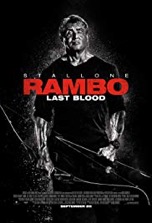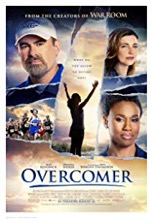October 2019
Rambo: Last Blood (R)
04/10/19 22:16 Filed in: 2019

Starring: Sylvester Stallone
September 2019
Warning! This is NOT a movie review. This is a critique of the film. Intended to initiate a dialogue, the following analysis explores various aspects of the film and may contain spoilers. Views are my own and elaborate on comments that were originally tweeted in real time from the back row of a movie theater @BackRoweReviews. For concerns over objectionable content, please first refer to one of the many parental movie guide websites. Ratings are based on a four star system. Happy reading!
Rambo: Last Blood is the fifth film in the series and is the continuation of the John Rambo saga, which last graced theaters eleven years ago with the generically titled Rambo. From the title, it’s clear that this film is intended to be the final in the franchise. However, as we’ve seen many times before, if a studio is prepared to back a sequel, writers have clever ways of bringing back action heroes. Last Blood cannily plays off the title of the first film, First Blood (1982), and denotes the completion of a cycle.
The movie opens on Rambo’s (Sylvester Stallone) ranch in Arizona, where he trains horses, sharpens weapons, and changes light bulbs in the subterranean tunnels he’s burrowed beneath his property. Though we aren’t really told how they came to know Rambo, college-aged Gabrielle (Yvette Monreal) and her grandmother live in the farmhouse. Rambo has become like a father to Gabrielle, who was abandoned when she was young.
The plot finds some traction when one of Gabrielle’s friends locates her long-lost father in Mexico. Unfortunately, the reunion with her father ends on a sour note. To clear her head, Gabrielle accompanies her friend to a nightclub. Soon after, she’s drugged and is taken by a group of sex traffickers. When Gabrielle doesn’t return home the next day, Rambo goes in search of Gabrielle’s abductors. Cue the bloodletting.
As can be gleaned from that nutshell overview, the story, by Stallone and Dan Gordon, is fairly predictable and uncomplicated. The movie is also slowly paced…nothing of import happens during the first half hour. The dialog, by Stallone and Matthew Cirulnick, is trite (“Feel my rage, feel my hate!”), but is actually a good fit for the laconic hero.
The direction by Adrian Grunberg is solid during the action scenes, but unimaginative for the bulk of the film. In his defense, Last Blood looks like a low budget production—the same half dozen sets/locations are repeatedly revisited throughout the movie, i.e. Rambo’s farm/tunnels, the nightclub in Mexico, the stoop of Gabrielle’s father’s house, Gabrielle’s friend’s house, etc.
Last Blood is a bit deceptive with respect to its action: the first half of the movie is pretty low-key, but the second half is an all-out splatter-fest. During the climatic showdown, Rambo sets a series of booby traps around and below his house: mercenaries fall into spike-pits, trigger wall-mines and trip wires that bring down logs with metal spikes in them, etc. The entire tunnel assault plays out like a more lethal, less light-hearted variation on the well-executed standoff in Home Alone.
For a mostly mindless revenge film, Last Blood has several salient messages (whether intended or not). One of the movie’s ongoing themes deals with the heart. Gabrielle has a hole in her heart from being orphaned. After suffering a loss, Gabrielle’s grandmother says she feels like her heart’s been cut out. The grief in Rambo’s heart drives him to literally rip out his enemy’s heart.
To its credit, the film raises awareness of the horrors of sex trafficking. Young women are shown being beaten, abused and treated like animals. In a scene reminiscent of Bryan Mills’ (Liam Neeson) rescue of his daughter in Taken (2008), Rambo enters a brothel, frees the other girls and extricates Gabrielle.
Though it has pieces of a relevant story (subplots involving sex trafficking, PTSD and abandonment), Last Blood never really coalesces into a complete film. The story is also extremely uneven; a slow start gives way to an uber-bloody climax. At just over an hour and a half, Last Blood doesn’t overstay its welcome, so that’s a plus.
Though Stallone is a bit stiff at times, he’s ended the franchise on his own terms and even gets to ride off into the sunset. However, this isn’t the send-off this beloved action hero deserved. Now that we’re done with Last Blood it’s time for some new blood (which will come next year in a remake with young actor Tiger Shroff).
The best part of the movie is a series of clips from the earlier Rambo films that play during the end credits.
Rating: 2 out of 4
Overcomer (PG)
03/10/19 21:29 Filed in: 2019

Starring: Alex Kendrick
August 2019
Warning! This is NOT a movie review. This is a critique of the film. Intended to initiate a dialogue, the following analysis explores various aspects of the film and may contain spoilers. Views are my own and elaborate on comments that were originally tweeted in real time from the back row of a movie theater @BackRoweReviews. For concerns over objectionable content, please first refer to one of the many parental movie guide websites. Ratings are based on a four star system. Happy reading!
The Kendrick Brothers (Alex and Stephen) have delivered a string of family-friendly, faith-affirming films over the years, including: Fireproof (2008), Courageous (2011) and War Room (2015). As with many of the Kendrick’s earlier movies, Overcomer uses sports as a vehicle for telling a tale of hope, faith and courage.
As the story opens, successful high school basketball coach John Harrison (Alex Kendrick) learns that the town’s manufacturing plant has closed its doors. John’s hopes of winning a state championship are dashed when many of his players are forced to move away with their families. Pressed into service as a long-distance running coach, John’s team consists of one runner, Hannah Scott (Aryn Wright-Thompson). In a cruel twist of fate, Hannah has asthma.
Through pure coincidence (or a Godincidence), John meets Thomas Hill (Cameron Arnett) when visiting someone else at a hospital. After striking up a conversation with the blind, bedridden man, John discovers that Thomas is Hannah’s long-lost father. The family drama heats up when Hannah meets Thomas for the first time and when her guardian grandmother (Denise Armstrong), who has intentionally kept Hannah from learning about her former drug addict father, finds out that Hannah’s been sneaking out to meet with Thomas.
Overcomer sets up in a similar manner to Disney’s McFarland, USA (2015), which chronicles the true story of high school track coach Jim White (Kevin Costner), who relocates to the titular town to become a cross-country coach. In this film, John doesn’t have to move, but the school’s principal (Priscilla Shirer) coaxes him into coaching a sport he knows next to nothing about. In both movies, unlikely athletes make it to the state championship, which results in a highly improbable, yet wholly satisfying story payoff.
Admittedly, the plot is oversimplified and idealistic to the extreme. Though the film has many saccharine moments, and even a few unnecessary scenes (the knee-slapping drama auditions, for instance), it has several salient themes, like: finding redemption, making amends (the movie cleverly avoids sermonizing by resolving the kleptomania subplot with a montage) and learning how to forgive.
Another theme that’s subtly woven into the fabric of the film is the discovery of identity. In a world where identity is confusing, complex and constantly in flux, Overcomer presents an extremely simple definition of identity that’s as counter-cultural as you’re likely to find. The movie’s core audience will embrace this interpretation of identity, but will it make an impact on the broader populace?
The film contains a number of nitpicks. For instance, in real life, people (especially non-relatives) wouldn’t be allowed to just stroll into a hospital (without visitor’s tags, no less) whenever they feel like it. Also, a cross-country team consists of seven runners, so Hannah wouldn’t be allowed to race by herself. Fortunately, these peccadilloes don’t significantly detract from the movie’s overall message or entertainment value.
In the final analysis, Overcomer is an inspirational story with heartfelt performances and pulse-pounding race scenes. Are you an Overcomer?
Rating: 3 out of 4